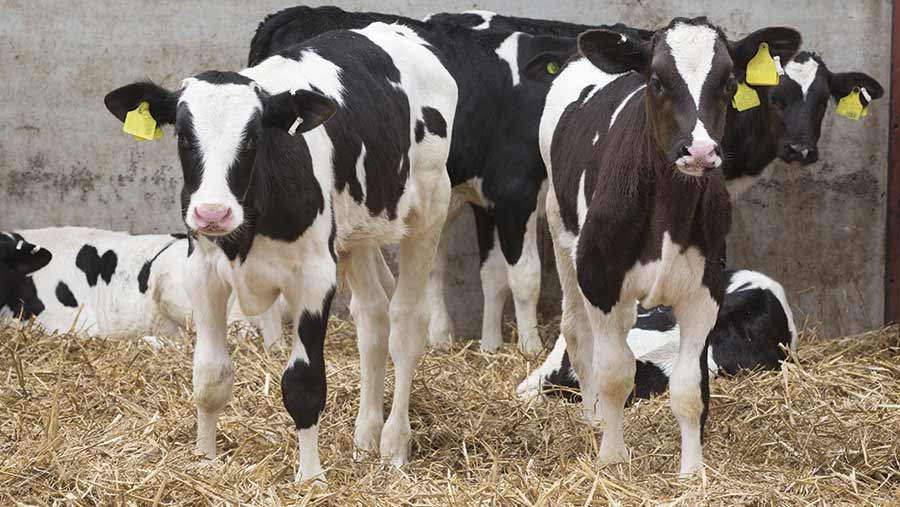6 steps to making calves more resilient to disease
 © Tim Scrivener
© Tim Scrivener Within the first few hours of calves entering the world, youngstock management practices will have a profound impact on lifetime health and performance.
According to Tim Potter from Westpoint Farm Vets, pneumonia and infectious scours are two of the most common diseases affecting youngstock, and action to prevent these calf health issues gaining a foothold on any unit is absolutely vital.
See also: Cheap monitoring kit can accurately test calf housing conditions
Below, Dr Potter gives his top tips on how to prevent disease by taking a multifactorial approach.
1. Improve colostrum intake
- Set guidelines for the volume of colostrum to be fed and the timeframe for it to be consumed. Feed three litres of colostrum within the first two hours of life and repeat again, ideally before the calf is 12 hours old
- When leaving the calf on the cow, monitor it closely to ensure it sucks and have a plan to intervene if necessary. If collecting colostrum and feeding via tube, the earlier it is collected postpartum, the higher quality it will be
- If you are storing colostrum to be used for other calves, always test the quality first to ensure only good colostrum is required and talk to your vet about Johne’s control.
2. Practice sound hygiene
Scours are caused by faecal contamination from the environment or cross-contamination from animals and equipment, so good hygiene is fundamental.
- Treat colostrum as if it is for human consumption. Ensure it is collected and stored in a clean manner
- Properly disinfect tubing and other oral feeding equipment and keep water troughs and feeders clean
- When assisting with calving, tools, clothing and hands need to be clean
- Pens should be well bedded, dry and not overstocked.
3. Make housing infrastructure a priority
Pneumonia is a respiratory disease heavily influenced by environmental factors such as housing.
- Good ventilation is crucial to keep air fresh without being draughty; humidity levels should be kept low.
- Install good drainage systems to prevent excess moisture
- Don’t overstock
- Avoid mixing youngstock at different ages in the same pens and sheds. Shared airspace will allow older animals to pass any infections to younger, more vulnerable animals.
4. Invest in vaccination
Vaccination increases the disease resistance of individual animals so they are less likely to become ill.
- Every farm is different, so work with your vet to develop a vaccination programme to suit your operation
- Follow vaccination protocols closely and store products correctly
- Don’t stop vaccinating youngstock if you get to a point where you think diseases such as scours and pneumonia are no longer an issue on your farm. You will only check the progress of your health programme and run the risk of disease problems emerging once again.
5. Practice antibiotic stewardship
Heavy and improper use of antibiotics can lead to issues with resistance, not only compromising the health and treatment success rates within an individual herd, but also that of the entire industry.
- Work with your vet to develop antibiotic treatment protocols. This needs to include training for everyone involved in the day-to-day management of livestock and show how to identify animals requiring treatment
- Don’t hold off treatment because this can lead to failures and the need for multiple treatments
- Always follow the label accordingly.
6. Work with your vet
- Set management protocols and make sure everyone involved in the care of the animals knows what to do
- Benchmark performance to understand where and how your youngstock management system can be improved
- Set targets for markers such as decreased disease and mortality rates.
A multi-date National Youngstock Association roadshow is taking place this autumn to share experience and knowledge about important calf health management approaches. The Youngstock 4LIFE Roadshow meeting dates are:
|
Date |
Location |
|
20 September |
Ashbourne, Derbyshire |
|
21 September |
Warnham, Sussex |
|
27 September |
Bungay, Suffolk |
|
27 September |
Chelmsford, Essex |
|
11 October |
Roche, Cornwall |
|
12 October |
Bridgwater, Somerset |
|
13 October |
Glastonbury, Somerset |
|
16 October |
Winchester, Hampshire |
|
25 October |
Daventry, Northamptonshire |
|
26 October |
Leighton Buzzard, Bedfordshire |
For further information and to reserve a place at a calf health meeting, email: abc@abccomms.co.uk
